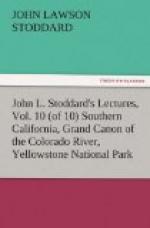[Illustration: MOQUI CART AND PLOW.]
[Illustration: MOQUI CHILDREN.]
It was late on the night succeeding our visit to Acoma that we arrived at Flagstaff, and our entire party was asleep. Suddenly we were aroused by a prolonged shout and the discharge of half a dozen revolvers. Five minutes later there came a general fusillade of pistol shots, and near and distant cries were heard, in which our half-awakened faculties could distinguish only the words: “Hurry up!” “Call the crowd!” “Down the alley!” Then a gruff voice yelled just beneath my window: “Let her go,” and instantly our locomotive gave a whistle so piercing and continuous that all the occupants of our car sprang from their couches, and met in a demoralized group of multicolored pajamas in the corridor. What was it? Had the train been held up? Were we attacked? No; both the whistle and the pistol shots were merely Flagstaff’s mode of giving an alarm of fire. We hastily dressed and stepped out upon the platform. A block of buildings just opposite the station was on fire, and was evidently doomed; yet Flagstaff’s citizens, whose forms, relieved against the lurid glow, looked like Comanche Indians in a war dance, fought the flames with stubborn fury. The sight of a successful conflagration always thrills me, partly with horror, partly with delight. Three hundred feet away, two buildings formed an ever-increasing pyramid of golden light. We could distinguish the thin streams of water thrown by two puny engines; but, in comparison with the great tongues of fire which they strove to conquer, they appeared like silver straws. Nothing could check the mad carousal of the sparks and flames, which danced, leaped, whirled, reversed, and intertwined, like demons waltzing with a company of witches on Walpurgis Night. A few adventurous men climbed to the roofs of the adjoining structures, and thence poured buckets of water on the angry holocaust; but, for all the good they thus accomplished, they might as well have spat upon the surging, writhing fire, which flashed up in their faces like exploding bombs, whenever portions of the buildings fell. Meantime huge clouds of dense smoke, scintillant with sparks, rolled heavenward from this miniature Vesuvius; the neighboring windows, as they caught the light, sparkled like monster jewels; two telegraph poles caught fire, and cut their slender forms and outstretched arms against the jet black sky, like gibbets made of gold. How fire and water serve us, when subdued as slaves; but, oh, how terribly they scourge us, if ever for a moment they can gain the mastery! Too interested to exchange a word, we watched the struggle and awaited the result. The fury of the fire seemed like the wild attack of Indians, inflamed with frenzy and fanaticism, sure to exhaust itself at last, but for the moment riotously triumphant. Gradually, however, through want of material on which to feed itself, the fiery demon drooped its shining crest, brandished its arms with lessening vigor, and seemed to writhe convulsively, as thrust after thrust from the silver spears of its assailants reached a vital spot. Finally, after hurling one last shower of firebrands, it sank back into darkness, and its hereditary enemy rushed in to drown each lingering spark of its reduced vitality.




